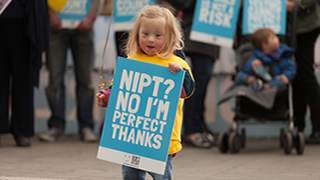Parliament to debate abortion on grounds of disability
- |

A bill to outlaw abortion on the grounds of disability was given its first reading in the House of Lords last week.
Conservative peer Lord Shinkwin introduced the Abortion (Disability Equality) Bill, which proposes to repeal the part of the 1967 Abortion Act that allows abortion up to birth, if there is a substantial risk of mental or physical disability.
Lord Shinkwin’s bill comes after the release of latest abortion statistics, which revealed an increase in the number of babies aborted on the grounds of disability in England and Wales.
'Obvious discrimination'
Introducing the private member’s bill, Lord Shinkwin said: "Discrimination on the grounds of disability after birth is outlawed. Yet today legal and lethal discrimination on the grounds of disability is allowed up to birth by law.
"It is illegal for an unborn human being to have their life ended by abortion beyond 24 weeks, but if they have a disability their life can be ended right up to birth by law. Where is the consistency, the justice or the equality in that?
"If anyone thinks such obvious discrimination is acceptable, I respectfully invite them to imagine the outcry if the same were applied to skin colour or sexual orientation. Such discrimination would rightly be regarded as outrageous."
In order for private member’s bills to become law, they must gain support from a majority of peers.
Non-invasive pre-natal testing
Abortion on the grounds of disability has gained increasing attention recently, due to new pre-natal testing which aims to screen unborn babies for Down’s syndrome.
Non-invasive prenatal testing (NIPT), also known as cell-free DNA (cfDNA) testing, screens a pregnant mother's blood for tiny fragments of DNA. These fragments are then checked for abnormalities, such as Down's syndrome and Edward's syndrome, at between 11 and 14 weeks of pregnancy.
This is being hailed by scientists as less invasive than the currently-used amniocentesis, which involves inserting a needle into the womb in order to take a genetic sample. This test carries a small risk of miscarriage.
Risk of increased abortions
NIPT has been widely criticised, however, due to the predicted increase of abortions on the basis of a Down’s syndrome diagnosis. Last year 689 babies in England and Wales were aborted on the basis of Down’s syndrome. The implementation of NIPT will lead to around 100 more unborn babies being aborted per year.
'Don't Screen Us Out' is campaigning to delay the use of the test, and Conservative MP Nigel Evans has warned Prime Minister David Cameron about its possible adverse effects, asking the Prime Minister how he will look at ways to protect those with Down’s syndrome, rather than screen them out.
Responding to Mr Evans' challenge, the Prime Minister said there are "moral and ethical issues that need to be considered" when screening for Down's syndrome, and that the Health Secretary, Jeremy Hunt, is "going to have to find a way through this".
Take action
You can help to speak against abortion on the basis of disability, protecting the vulnerable in our society and affirming the God-given value of every human life.
- 'Don't Screen Us Out' has called upon the general public to contact their MPs and ask them to sign the Early Day Motion. Its website's 'Email your MP' feature will allow you to send an editable pre-written letter to your MP highlighting the dangers behind the new tests.
- Alternatively, you may wish to contact your MP by letter, which typically has a better outcome.
- Please do also pray for a positive outcome to the debate regarding non-invasive prenatal testing, and for widespread support for the bill to outlaw abortion on the grounds of disability.
Related Links:
Early Day Motion calls for Down's syndrome screening delay
Prime Minister questioned on screening out people with Down's Syndrome
Don't Screen Us Out initiative to protect babies with Down's
Abortion (Disability Equality) Bill [HL] 2016-17 (Parliament)
